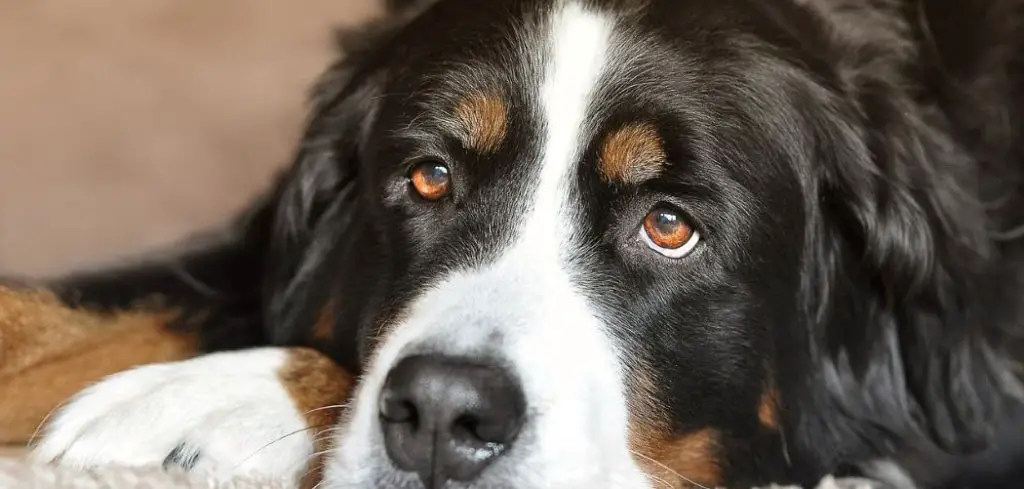A dog hacking cough accompanied by mucus can be worrying. While occasional coughing may be harmless, persistent coughing with mucus discharge suggests that the airways or lungs may be affected.
We outline the common causes of a dog’s hacking cough with mucus, what you can do at home, and when to seek veterinary help.
Dog Hacking Cough Mucus: Why It Happens
A dog hacking cough with mucus happens when the respiratory system produces excessive secretions or becomes irritated. Conditions affecting the lungs, bronchi, or throat can cause inflammation that triggers a coughing reflex to expel mucus.
Mucus buildup may result from infections, allergies, heart disease, or airway obstruction. In some cases, mucus can appear thick, yellow, or green, indicating infection, while clear mucus may suggest mild irritation or allergies.
Dogs use coughing as a protective reflex to clear their airways of irritants, mucus, or foreign material.
Observing the consistency, color, and frequency of mucus, along with other symptoms, can help you determine if veterinary care is needed.

Dog Hacking Cough Mucus: Common Causes
Pneumonia
Pneumonia is an infection of the lungs that can cause persistent coughing with thick mucus discharge. Bacteria, viruses, fungi, or aspiration of foreign material can trigger pneumonia.
Affected dogs may show labored breathing, lethargy, fever, reduced appetite, and bluish gums in severe cases.
Pneumonia is serious and requires prompt veterinary care, including antibiotics or supportive therapy, to prevent long-term lung damage or respiratory failure.
Read more: Dog hacking cough and spitting up (Here’s why)
Kennel Cough
Kennel cough, or infectious tracheobronchitis, is one of the most common causes of a dog hacking cough with mucus.
This highly contagious respiratory infection inflames the trachea and bronchi, causing a dry, hacking cough that can produce mucus.
Dogs often exhibit retching, gagging, or mild fever alongside coughing. While it is usually self-limiting, severe cases or dogs with compromised immune systems may require veterinary treatment, as secondary bacterial infections can develop.
Heart Disease
Certain heart conditions, especially congestive heart failure, can contribute to coughing and mucus buildup.
Fluid accumulation in the lungs and airways irritates the respiratory system, triggering a cough.
You may notice coughing at rest, difficulty breathing, reduced stamina, or swelling in the abdomen and legs.
Early diagnosis is vital, as untreated heart disease can worsen rapidly and significantly impact a dog’s quality of life.
Allergies
Dogs can develop airway inflammation in response to allergens or environmental irritants, producing mucus that leads to a hacking cough.
Common triggers include pollen, dust, mold, smoke, or household chemicals. Dogs with allergic reactions may also sneeze, have watery eyes, or show seasonal variations in symptoms.
Minimizing exposure and using air purifiers or hypoallergenic bedding can reduce coughing and improve comfort.
Collapsing Trachea
A collapsing trachea occurs when the cartilage rings in the windpipe weaken, leading to airway collapse and coughing episodes.
Coughing can be triggered by excitement, pressure on the trachea, or increased mucus production.
Small and toy breeds are particularly susceptible. You may notice a honking cough, gagging, or difficulty breathing, especially during activity.
Managing triggers and seeking veterinary advice can prevent worsening of the condition and maintain airway health.
Chronic Bronchitis
Chronic bronchitis is long-term inflammation of the airways that results in persistent coughing with mucus production.
The condition can develop due to repeated infections, irritants, or underlying respiratory disease.
Signs include a daily hacking cough, exercise intolerance, and occasional gagging. Left untreated, chronic bronchitis can lead to permanent airway damage and increased susceptibility to infections.
Related: Dog hacking cough randomly (Why it happens)
What to Do If Your Dog Has A Hacking Cough With Mucus
Monitor your dog’s coughing patterns, noting the frequency, mucus color, and any triggers. Keeping your dog calm and minimizing exposure to irritants such as smoke, dust, or strong cleaning agents can help reduce coughing episodes.
Use a humidifier in dry environments to soothe the airways and thin mucus. Ensure your dog remains well-hydrated, as water helps mucus stay fluid and easier to expel.
For mild infections, rest and supportive care may be sufficient, but always track symptoms and seek veterinary advice if they persist or worsen.
Avoid giving human cough medications, as they can be harmful to dogs. Elevating your dog’s sleeping area or using specialized harnesses instead of collars can relieve airway pressure in cases of tracheal sensitivity.
Offering small, frequent meals can also prevent aspiration if your dog has swallowing difficulties.
When to Call or Visit Your Vet
Immediate veterinary attention is necessary if your dog shows labored breathing, blue gums, persistent coughing with green or yellow mucus, or lethargy.
If coughing episodes are frequent, worsen over time, or are accompanied by fever, loss of appetite, or vomiting, consult your veterinarian promptly.
Diagnostic testing such as chest X-rays, blood work, heart evaluation, or tracheal examination may be recommended to identify the underlying cause.
Timely treatment is crucial to prevent complications such as pneumonia, chronic lung damage, or worsening of heart disease.
Read more: Dog Hacking Cough After Drinking Water (Understand why)
Key Takeaway
A dog hacking cough with mucus can indicate a range of conditions, from mild irritation or allergies to serious infections, tracheal issues, or heart disease.
Careful observation, environmental management, hydration, and timely veterinary evaluation are key to protecting your dog’s respiratory health.
Even if symptoms seem mild, persistent or severe coughing with mucus should never be ignored, as early intervention ensures your dog remains comfortable, healthy, and happy.
